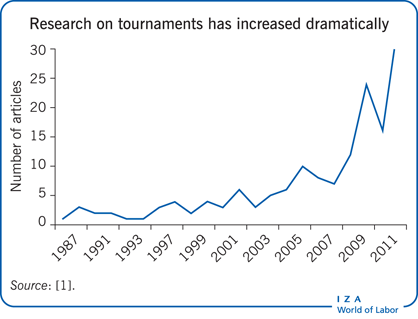Elevator pitch
Tournaments are commonly used in the workplace to determine promotion, assign bonuses, and motivate personal development. Tournament-based contracts can be very effective in eliciting high effort, often outperforming other compensation contracts, but they can also have negative consequences for both managers and workers. The benefits and disadvantages of workplace tournaments have been identified in an explosion of theoretical, empirical, and experimental research over the past 30 years. Based on these findings, suggestions and guidelines can be provided for when it might be beneficial to use tournaments in the workplace.
Key findings
Pros
Tournaments can create powerful competitive incentives, motivating individuals to exert effort levels well above those predicted by the rational decision-making model.
Tournaments provide non-monetary incentives in the form of recognition and winning.
When compared to other compensation schemes, tournaments may require less information about individual performance.
Common shocks, such as stock market fluctuations, have less of an effect on tournament-based incentives.
Tournaments play an important function of matching better workers to better jobs.
Cons
The win-or-lose structure of tournaments creates some winners at the expense of many losers, leading to substantial payoff inequality.
Relative incentives create a “discouragement effect,” causing lower-ability workers to cut back effort or withdraw entirely from competition.
Workers view each other as competitors when using relative incentives, resulting in more selfish and less helpful behavior.
Tournaments may encourage counterproductive behaviors such as cheating, sabotage, and collusion.
Women may be discouraged from participating in tournaments, even when they are more capable and have better skills than men.
